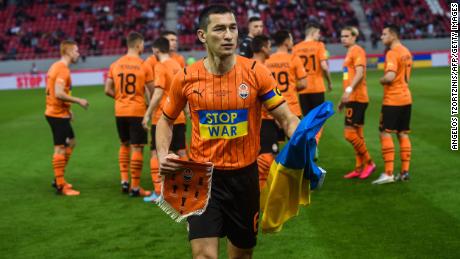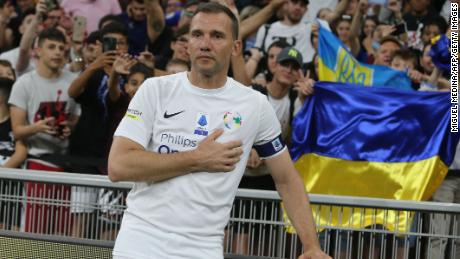Although the stadium has a capacity of around 70,000, no fans were present as the league takes security measures to protect its civilians from ongoing Russian attacks.
It’s one of many precautions implemented to try to keep players and staff as safe as possible, including bomb shelters and air-raid sirens.
But, having been forced to cancel last season’s league campaign on February 24 due to the invasion, it’s a bit of normalcy for Ukraine’s beleaguered population.
Pavelko also explained that many people on the frontline of the Ukrainian military, including President Volodymyr Zelensky, were a key driving force behind the push to return football to the country.
Ukrainian football icon Andriy Shevchenko says sport has a major role to play in uniting the people behind his country.
“Even if we are at war inside the country, we will fight because we also want to live like normal countries, normal lives.”
Return
With no football in Ukraine, teams have played charity games across Europe, although the qualifying stages for European competition have started in recent weeks, to which Dynamo Kyiv, SC Dnipro- 1, Zorya Luhansk and Vorskla Poltava participated.
And when the players walked onto the pitch, it looked very different from previous years.
Pavelko told Reuters that whenever an air raid siren sounds – a daily occurrence in some areas – the match will be stopped and players and officials will take refuge in stadium bomb shelters until everything is cleared. be clear.
Military officials will be in the stadiums during the match, and if an air raid warning lasts for more than an hour, between them and the match officials, they will decide whether the match will be postponed.
For Shakhtar midfielder Taras Stepanenko, he says he is slightly worried about long breaks in games and possible resulting muscle injuries.
“It will be difficult if it lasts more than an hour. Maybe they should install (training) bikes for us,” Stepanenko said.
At the start of the new season, matches will be played in Kyiv and surrounding regions, according to Pavelko.
The structure of the teams involved also had to be changed. Desna Chernihiv and FC Mariupol, two of last season’s Premier League sides, had to be replaced as their stadiums were destroyed by war.
Invasion also had a drastic change on the players who will take to the field in the new season.
One of the most successful clubs in Ukrainian football, Shakhtar has always had a strong core of Brazilian players. However, following the invasion of Russia, many have chosen to leave the country, meaning the team now focuses more on young local talent.
And on the eve of the new campaign, new head coach Igor Jovicevic said he needed to rebuild quickly.
“For a long time there was a Brazilian Shakhtar, a top team,” Jovicevic said. “But now we have to forget that and prepare the new (team) as soon as possible.”
Although the return of football to Ukraine is a blessing for many, Pavelko lamented the long-term implications of the war on the country’s football prospects.
“It’s not just about losing stadiums. It’s about a whole generation of footballers who won’t be able to develop.”
CNN’s Ben Church contributed to this report.


